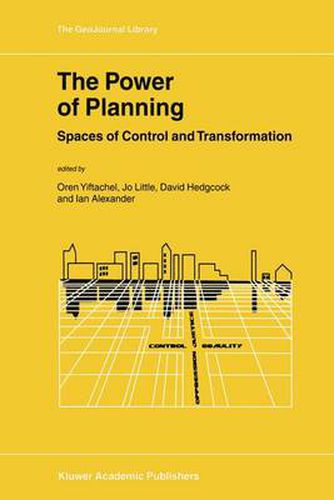Readings Newsletter
Become a Readings Member to make your shopping experience even easier.
Sign in or sign up for free!
You’re not far away from qualifying for FREE standard shipping within Australia
You’ve qualified for FREE standard shipping within Australia
The cart is loading…






This title is printed to order. This book may have been self-published. If so, we cannot guarantee the quality of the content. In the main most books will have gone through the editing process however some may not. We therefore suggest that you be aware of this before ordering this book. If in doubt check either the author or publisher’s details as we are unable to accept any returns unless they are faulty. Please contact us if you have any questions.
The book addresses critically the question: What is the societal impact of urban and regional planning? . It begins with a theoretical discussion and then analyses, through a series of case studies, the intentions, contents, struggles and consequences of urban and regional planning. It shows that plans and policies often defy the commonly perceived role of advancing equality, justice, development and amenity, by causing social problems, marginalisation and inequalities. The book differs from most texts in the field by looking at planning from a critical distance, without a priori belief in its necessity or usefulness. The 12 chapters, written by renowned international scholars, demonstrate the multiplicity of social and political struggles over the contested terrain of spatial policies. The book focuses on four key areas where the impact of planning is explored: the community power, gender relations, ethnic tensions, and social polarisation, while comparing three societies: Australia, Israel and England. Audience: This volume is mainly intended for faculty and students of academia, but also for urban professionals and policy-makers. The book is relevant to fields such as urban and regional planning, geography, political science, urban studies, urban sociology, urban anthropology, ethnic and gender relations.
$9.00 standard shipping within Australia
FREE standard shipping within Australia for orders over $100.00
Express & International shipping calculated at checkout
This title is printed to order. This book may have been self-published. If so, we cannot guarantee the quality of the content. In the main most books will have gone through the editing process however some may not. We therefore suggest that you be aware of this before ordering this book. If in doubt check either the author or publisher’s details as we are unable to accept any returns unless they are faulty. Please contact us if you have any questions.
The book addresses critically the question: What is the societal impact of urban and regional planning? . It begins with a theoretical discussion and then analyses, through a series of case studies, the intentions, contents, struggles and consequences of urban and regional planning. It shows that plans and policies often defy the commonly perceived role of advancing equality, justice, development and amenity, by causing social problems, marginalisation and inequalities. The book differs from most texts in the field by looking at planning from a critical distance, without a priori belief in its necessity or usefulness. The 12 chapters, written by renowned international scholars, demonstrate the multiplicity of social and political struggles over the contested terrain of spatial policies. The book focuses on four key areas where the impact of planning is explored: the community power, gender relations, ethnic tensions, and social polarisation, while comparing three societies: Australia, Israel and England. Audience: This volume is mainly intended for faculty and students of academia, but also for urban professionals and policy-makers. The book is relevant to fields such as urban and regional planning, geography, political science, urban studies, urban sociology, urban anthropology, ethnic and gender relations.